Why are swear words bad? For centuries, society has labeled profanity as rude, offensive, or even immoral. Swear words are often censored on TV, bleeped out in music, and frowned upon in classrooms and workplaces.
But why is swearing bad in the first place? The answer is more about social norms than science. Swear words are powerful because they break the rules. They’re taboo, and that taboo gives them emotional punch. When you curse, you’re signaling strong feelings—anger, frustration, surprise, or even joy.
The Science: Swearing Is a Sign of Intelligence
The Surprising Link Between Swearing and IQ
So, is there any truth to the claim that swearing is a sign of intelligence? According to several studies, the answer is yes. Researchers have found that people with higher verbal intelligence tend to know—and use—more swear words. In fact, a 2015 study published in Language Sciences found that people who could generate more curse words in a timed test also scored higher on measures of overall vocabulary and verbal fluency.
Why? Swearing requires a deep understanding of language, context, and social cues. It’s not just about blurting out random words; it’s about knowing when, where, and how to use them for maximum effect.
Swearing and Emotional Intelligence
It’s not just about IQ. Swearing can also be a sign of high emotional intelligence. People who curse are often better at expressing their feelings and connecting with others. Swearing can help relieve pain, reduce stress, and even build social bonds.
A psychologist explained, “Swearing is a form of emotional release. It helps people process strong feelings and communicate them to others in a way that’s honest and direct.”
Why Is Swearing Bad? The Double-Edged Sword
If swearing is so smart, why is swearing bad in the eyes of so many? The answer lies in context. While swearing can be a sign of intelligence and authenticity, it can also offend, alienate, or escalate conflicts if used carelessly.
The Risks of Swearing
- Offending others: Not everyone appreciates colorful language, especially in formal or sensitive settings.
- Damaging your reputation: Excessive swearing can make you seem unprofessional or disrespectful.
- Legal or workplace consequences: Some environments have strict rules against profanity.
The Benefits of Swearing
- Pain relief: Studies show that swearing can actually increase pain tolerance.
- Stress reduction: Letting out a curse word can help you blow off steam and feel better.
- Social bonding: Swearing with friends can create a sense of camaraderie and trust.
So, why is cursing bad? It’s not inherently bad—it’s all about how, when, and where you use it.

Why Is Cursing Bad? The Cultural Perspective
Cursing, like any form of language, is shaped by culture. In some countries, swearing is more accepted; in others, it’s strictly taboo. Even within the same language, different words carry different weights.
For example, what’s considered a mild expletive in the UK might be deeply offensive in the US, and vice versa. This cultural context is key to understanding why is cursing bad in some places but not in others.
Swearing in the Workplace
In 2025, more companies are rethinking their policies on swearing. Some startups embrace a relaxed, authentic culture where the occasional curse word is no big deal. Others maintain strict codes of conduct. The key is knowing your audience and adapting your language accordingly.
Is Yelling a Sign of Low Intelligence? The Difference Between Swearing and Shouting
Let’s clear up a common misconception: Is yelling a sign of low intelligence? Not necessarily. Yelling is often a sign of strong emotion, not low IQ. However, people who rely on shouting to communicate may struggle with emotional regulation or conflict resolution.
Swearing, on the other hand, can be a clever way to express emotion without raising your voice. In fact, studies show that people who swear are often better at managing stress and navigating social situations.
So, while yelling might not be the best way to get your point across, swearing—used thoughtfully—can actually be a sign of intelligence and emotional savvy.
Real-Life Example: Swearing in the Wild
Consider the story of a software engineer who was known for his sharp wit and occasional salty language. During a high-pressure product launch, he let out a string of creative curses when a server crashed. Instead of getting angry, his team laughed, relaxed, and quickly solved the problem together. Later, he said, “Swearing broke the tension. It made us feel like a team, not just coworkers.”
This real-life example shows how swearing, when used appropriately, can foster connection and resilience.
The Psychology of Swearing: What’s Really Going On?
Swearing as a Coping Mechanism
When you stub your toe or get bad news, what’s the first thing that comes out of your mouth? For many, it’s a curse word. That’s because swearing activates the brain’s fight-or-flight response, releasing endorphins and helping you cope with pain or stress.
Swearing and Honesty
People who swear are often seen as more honest and trustworthy. A 2017 study found a positive correlation between profanity and integrity. Swearing can signal authenticity, showing that you’re not afraid to speak your mind.
Swearing and Creativity
Coming up with new ways to curse requires creativity and linguistic flexibility. People who swear often have a richer vocabulary and a better grasp of language nuances.
Swearing in Pop Culture: From Taboo to Trendy
Swearing has always been a part of pop culture, from Shakespeare’s clever insults to today’s viral memes. In 2025, profanity is more visible than ever, thanks to social media, streaming platforms, and changing attitudes.
Celebrities, comedians, and influencers use swearing to connect with audiences, express emotion, and stand out in a crowded digital landscape. But even as swearing becomes more mainstream, it’s still important to know when to dial it back.
The Pros and Cons of Swearing: A Balanced View
Pros
- Expresses strong emotion
- Relieves pain and stress
- Builds social bonds
- Signals honesty and authenticity
- Demonstrates verbal intelligence
Cons
- Can offend or alienate others
- May damage professional reputation
- Not suitable for all audiences
- Can escalate conflicts if misused
Swearing and the Brain: What Neuroscience Reveals
Recent brain imaging studies show that swearing activates unique neural pathways, different from those used in regular speech. This suggests that profanity taps into deep emotional centers, making it a powerful tool for communication.
Swearing can also help people process trauma, grief, or anger. Therapists sometimes encourage clients to express themselves freely—including with curse words—to promote healing and self-acceptance.
Swearing in Different Languages: A Global Phenomenon
Every language has its own set of swear words, and each culture uses them differently. In some places, swearing is a sign of camaraderie; in others, it’s a serious offense. Understanding these nuances can help you navigate global conversations with sensitivity and respect.
Swearing and Gender: Breaking Stereotypes
For years, swearing was seen as a “male” behavior, but research shows that women swear just as much as men—sometimes more. In 2025, gender norms around language are shifting, and people of all backgrounds are claiming the right to express themselves fully.
Swearing and Age: From Kids to Seniors
Parents often worry about kids picking up bad language, but studies show that swearing peaks in adolescence and then levels off. Seniors, on the other hand, may use swearing as a way to assert independence or cope with aging.
Swearing in the Digital Age: Social Media and Online Communities
Online, swearing can be a way to build identity, signal group membership, or push back against authority. But it can also lead to misunderstandings or online “cancel culture” if taken out of context.
Swearing and Mental Health: The Therapeutic Side
Some therapists encourage clients to use swearing as a way to process difficult emotions. Swearing can help people feel more in control, less anxious, and more connected to their feelings.
Swearing and Relationships: The Glue That Binds?
Believe it or not, couples who swear together may stay together. Shared language—including profanity—can strengthen bonds and create a sense of intimacy.
In 2025, more workplaces are adopting flexible language policies. Some teams embrace swearing as a sign of authenticity and creativity, while others maintain strict codes of conduct. The key is to read the room and know your audience.
Swearing and Education: Should We Teach Kids About Profanity?
Some educators argue that teaching kids about swearing including when not to use it—can promote emotional intelligence and self-control. Others worry it sends the wrong message. The debate continues.
Swearing and the Law: When Is It a Crime?
In some places, swearing in public can lead to fines or even arrest. But legal attitudes are changing, and many courts now recognize the right to free expression—even if it’s a little salty.
Swearing and Technology: AI, Voice Assistants, and Profanity Filters
As AI becomes more advanced, so do profanity filters. But even the smartest tech sometimes struggles to understand context. In 2025, developers are working to create more nuanced systems that can distinguish between harmless venting and actual abuse.
Swearing and Self-Expression: Finding Your Voice
At the end of the day, swearing is just one tool in your linguistic toolbox. Used thoughtfully, it can help you express yourself, connect with others, and even boost your brainpower.
FAQs
Q. Is swearing really a sign of intelligence?
A. Yes, research shows that people with higher verbal intelligence often know and use more swear words. Swearing requires linguistic skill, creativity, and social awareness.
Q. Why are swear words bad in some cultures?
A. Swear words are considered bad because they break social norms and can offend others. The taboo gives them emotional power, but context matters.
Q. Why is cursing bad for your reputation?
A. Excessive or inappropriate swearing can make you seem unprofessional or disrespectful, especially in formal settings. It’s important to know your audience.
Q. Is yelling a sign of low intelligence compared to swearing?
A. Yelling is often a sign of strong emotion, not low intelligence. Swearing, when used thoughtfully, can actually signal high emotional and verbal intelligence.
Final Thoughts
The next time someone tells you to “watch your language,” remember: swearing is a sign of intelligence, creativity, and emotional depth. It’s not about being rude—it’s about being real. Just use it wisely, and you’ll find that a well-placed curse word can be a powerful tool for connection, stress relief, and self-expression.
CLICK HERE FOR MORE BLOG POSTS
“In a world of instant takes and AI-generated noise, John Authers writes like a human. His words carry weight—not just from knowledge, but from care. Readers don’t come to him for headlines; they come for meaning. He doesn’t just explain what happened—he helps you understand why it matters. That’s what sets him apart.”

